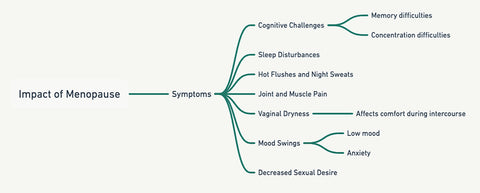
Menopause
Peri-menopause is like the opening act to menopause, where your hormone levels begin their rollercoaster ride. Oestrogen and progesterone levels start to change and your ovaries begin to take it easy, leading to a dip in fertility. This stage might kick off in your late thirties or early forties, though for some, it hits the stage a bit later—thanks to our genetic lineup.
Menopause, on the other hand, is the main event. It's when ovulation takes its final bow, menstrual periods exit stage left, and natural fertility turns off the spotlight. This big transition usually happens somewhere between 45 and 55 years old, with 51 taking the spotlight as the average starting age. Yet, for about 1% of us, menopause decides to show up early, before the age of 40, known as premature menopause or premature ovarian insufficiency. It's a significant milestone, marking a new chapter in our lives.
The reduction in hormone levels during menopause leads to a variety of symptoms that can profoundly affect our daily lives. These symptoms may begin months or even years before menstruation ends and typically persist for about four years after the last period. They include:

Besides the symptoms that hit us right away, there's a bigger picture to consider. With dropping oestrogen levels, we're at a higher risk for some pretty serious health issues, like osteoporosis, heart disease, and even a greater chance of dementia. To tackle these risks, we need to think about changes in what we eat and how we live. This isn't just about making menopause easier in the short term; it's about making choices that will keep us healthy and strong for years to come.
When we talk about managing menopause, it's really important to understand there are two main strategies we need to think about. On one hand, we're looking at ways to ease those day-to-day symptoms that can be really bothersome. On the other, we're focusing on how to lower our chances of running into bigger health problems down the road. By tackling menopause from both angles, we're not just making our daily lives more comfortable; we're also taking proactive steps to protect our health in the future.
What we can achieve working together:
- Reduce hot flashes and night sweats
- Reduce vaginal dryness and improve libido
- Reduce mood swings and feeling low or anxious
- Prevent weight gain and optimise metabolism
- Preserve your bone strength and muscle strength
- Reduce the risk of cardiovascular disease
Navigating perimenopause and menopause is a personal journey, and I'm here to tailor our consultations to your needs. Here's a glimpse into some of the common themes we often explore:
- Achieving optimal levels of key micronutrients in menopause via food and supplementation
- The balance of macronutrients for health and preserving (or achieving) a healthy weight
- Dietary and lifestyle changes to stabilise blood sugars and reduce insulin resistance
- Creating a healthy gut microbiome
- Preserving the strength of your bones through a combination of diet and lifestyle
- Dietary changes to protect your heart health
- Exploring the available evidence for the use of supplements to improve menopause symptoms





